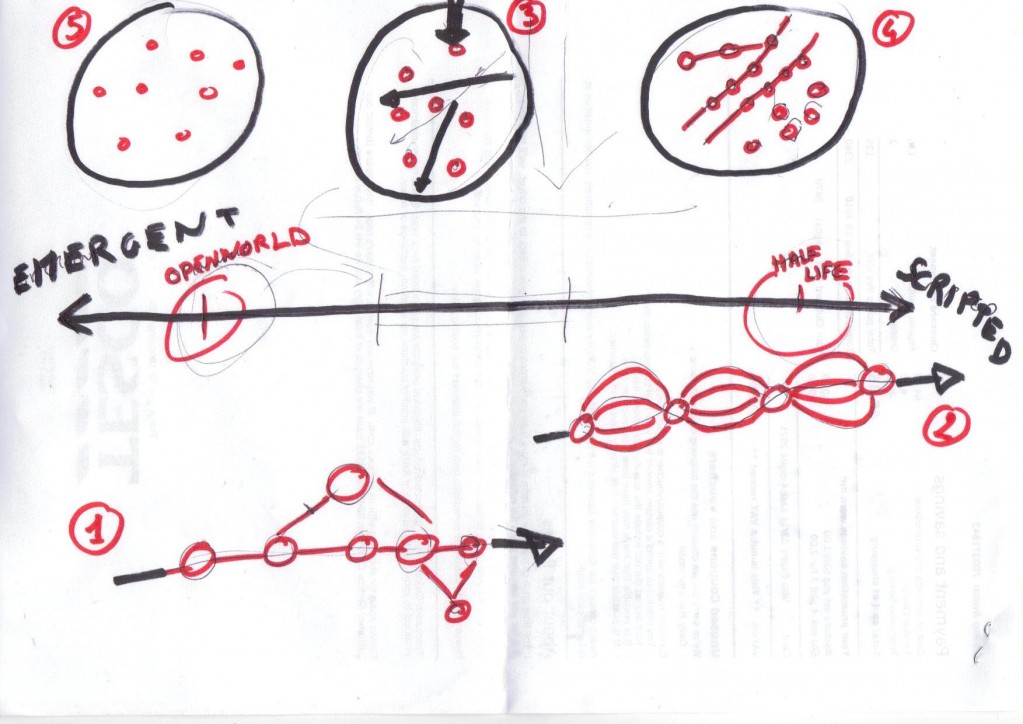《Echo Bazaar》制作者谈如何进行游戏故事设计
作者:JOSSELIN
去年9月,我有幸在参加伦敦Playful大会上遇见Alexis Kennedy。他是Failbetter Games的创立者,也是广受称赞的文字游戏《Echo Bazaar》的制作者。他对如何编就游戏和故事有很深的见解。
他曾做过一个比喻:“许多人认为好游戏应该有更多的故事。但这种说法就像是只要添加原料就可以烹制出一道好菜一样。结果好坏不仅取决于每种成分的含量,事实上烹调的过程和技术更为关键。”我将解释Alexis如何用新方法来烹调这道菜。
自然游戏和脚本游戏
游戏分为两个极端。如果游戏脚本更多,那么给玩家提供的自由选择(FoC)就更少。一个完美的脚本游戏看起来就像是部电影。另一个极端是自然游戏,尽管有一套掌控互动的规则,但其中是开放的世界。脚本游戏和自然游戏之间的区域很少为人们所顾及,而这正是Failbetter Games瞄准的目标。
状态过渡
让脚本故事显得强劲的原因在于角色的状态(游戏邦注:包括角色的身体、情感和人际关系等状态)通常与他处理事件的方式有关。脚本游戏靠得是人物状态,由FoC带来分支(如图1所示):每个新选择在状态图表中都是一个新的分支。问题在于不断增长的复杂性,称为组合爆炸。这个将更多游戏引进故事的过程很难处理。某些方法已经被发明出来了,如引进强制性状态,在多重分支间组建故事支撑结构(如图2)。这种方式下,复杂性只能随分支线性增长。但是这种技术通常使游戏深度受到限制。
故事的内涵
在另一个极端中,开放世界与角色的状态并没有关联。角色自在漫步,自由碰到某个事件发生(如图5)。然而,随机事件并不会提供故事情节。重新引进某些结构故事的方法是在世界中插入事件的脚本链(如图4)。这些链以角色接受任务(游戏邦注:类似于《魔兽世界》或《侠盗猎车手》中角色的行为)的形式组织起来。然而,实力强劲的故事应该能开发出多重阶层。以高质量电视剧为例,第一集介绍初始故事,花数集的笔墨来让故事得以深入,在以最后的故事来综述。在开放世界中逐步灌输不连贯的脚本事件链只是达到第一个层面。
松散的连结故事结构
脚本游戏有更强大的故事但FoC不够,而自然游戏有强劲的FoC但情节一致性较弱。Alexis发明了使用在《Echo Bazaar》中的技术,将FoC和故事连接起来。首先要处理的是状态。是像无状态的开放世界那样吗?并不全是,状态被品质所取代,这些数值看似会影响玩家历经的事件、做出的选择和角色的演变。自然事件和选择可能让某些品质值增加或减少。这些品质包括:危险性、警惕性、说服能力等等。
第二项技术便是将故事模块化,品质值引入并因称为“Storylet”(如图3)的故事结构而发生改变。这些Storylet就是首批故事。各个Storylet独立构建,你无须完成一个Storylet就能够开始另一个的构建。Storylet受品质值制约,而Storylet也可改变品质值。因此,Storylet与品质间的联系较为宽松。
在《Echo Bazaar》中,只有当某些品质达到一定的要求,世界中的部分故事才会解锁。更不同寻常的是,某些区域(游戏邦注:比如某些Storylet)是遥不可及的。你无法从头开始,选择不同的路径。时间无法倒回,选择必然有自己的结果:它们决定了故事世界的轨迹。比如在游戏中,参与谋杀会让你更有可能做出同样的事情,这可能会让你进入黑社会,一个全新的故事就此揭开。这种产生分歧和强制的机制让故事提升到一个新的高度。
结论
利用代码领域的技术(游戏邦注:如模块化和松散连接单位),Alexis成功制作出含有故事内涵的游戏世界,而实现方法既不是脚本游戏也不是自然游戏。(本文为游戏邦/gamerboom.com编译,转载请注明来源:游戏邦)
Narratives in games: the recipes of Alex Kennedy creator of Echo Bazaar
JOSSELIN
Attending the Playful conference in London last in september 2010 I had the chance to meet with Alexis Kennedy, founder of Failbetter Games, the editor of Echo Bazaar, a text game that has received much critical acclaim. He had very enlighting thoughts about how to articulate games and narratives.
To start with here is a comparison he made: “Some people call for better games by putting more narrative into the mix. But it is like saying that in order to make a better meal you just have to put more of this and more of that. The result is not only about the quantity of each ingredient. It’s actually more about the process and the techniques used to cook the meal.” I’ll try to explain how Alexis is attempting to figure out new ways to cook…
Emergent vs scripted games
Games can be divided into two groups that lies at both end of a spectrum. The more scripted a game is the less freedom of choice (FoC) it gives to the player. A perfectly scripted game would look like a movie. At the other end of the spectrum are emergent games where a set of rules govern interactions, but are open ended like open worlds. The area inbetween scripted and emergent games is a very little explored country that Failbetter Games is aiming at.
State transitions
What makes a scripted narrative powerful is that the state the character is in (physical/emotional/relational/… state) is always relevant to the way he handles event. Scripted games rely on states, and FoC introduces branching (see figure 1): each new choice creates a new branch in the states graph. The issue is the growing complexity called combinatory explosion. This process of introducing more game into the narrative is intractable, it does not scale. Some ways have been devised such as the introduction of mandatory states that form the backbone of the story with multiple branches inbetween (see figure 2). This way the complexity is only growing linearly with branching. However such techniques limit the depth of the game since it is always, to some extent, the same game that is played.
The sense of story
At the other side of spectrum, open worlds do not keep track of the state of a character. Characters wander subjected to random encounters/events (figure 5). However random events do not provide a sense of story at any level. A way to reintroduce some structured narrative is to inject scripted chains of events in the world (figure 4). These chains are followed by the character upon acceptation of a mission (in WoW or GTA). However, a powerful story should develop at multiple levels. Consider quality TV dramas: a first narrative arc spans over one episode, a deeper intrigue bridges over a couple episodes, and third order narratives traverse a whole season or the whole show. Instilling disconnected chains of scripted events in open worlds does not get you further than first order narratives.
Loosely coupled narrative structures
Scripted games have strong narratives but do not scale with FoC, whereas emergent games have strong FoC but provide a weak dramaturgic consistency. Alexis devised techniques used in Echo Bazaar to combine FoC and narrative. The first is to get rid of states. Like stateless open worlds? Not exactly: states are replaced with qualities, which are numeric values seen as representations/proxys that reflect the events the player went through, the choices he made and its evolution as a character. Depending on their nature events and choices increase or decrease some qualities values. A few examples of qualities: dangerous, watchful, persuasive, shadowy,….
The second technique is to modularize the narrative: qualities values give access and are modified by narrative structures called storylets (see figure 3′, and read the Failbetter blog to know more about them). These storylets are first order narratives. Storylets are structurally independant one from another: beginning a storylet does not require that you finish any other specific one. Storylets availability is conditional on qualities values, which are altered by the storylets. Storylets are hence loosely coupled through qualities.
In Echo Bazaar some parts of the narrative world are unlocked when certain qualities reach a given threshold, classic. More unusual: some areas (i.e. some storylets) become inaccessible. You don’t get to go back and take a different path. Time is a one-way street and choices have consequences: they determine trajectories in the narrative world. For example, in the game, committing a murder makes you more likely to do it again, which might enable you to enter the mob and a whole new narrative territory unveils that would have gone unnoticed otherwise. Such bifurcation and reinforcement mechanisms enable higher order narratives.
Conclusion
Using techniques borrowed from the coding field (modularization, loosely coupled modules) Alexis has managed to create a game world that both scales and provides a sense of story, which can be achieved neither with scripted nor with emergent games (no judgement here of one being superior to another, they just are intrinsically different). (Source: Experience Curve)









































 闽公网安备35020302001549号
闽公网安备35020302001549号